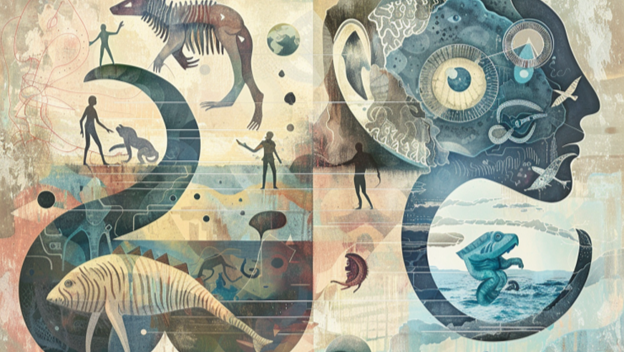
Help Publish Book 'Science as Cultural Expression'
Donation protected
Hello,
My name is Fatos A. Kopliku and I am asking your support for the publication of my book Shkenca Moderne

si Shprehje Kulturore (Modern Science as a Cultural Expression) in Albanian. It is a collection of six essays originally published in the journal Peizazhe te Fjales (Word Landscapes) of the well known publicist Ardian Vehbiu. It was not my plan to compile the essays in a book, but I was convinced by the insistence of some friends and the responses from some of the readers.
Before I give some more information about the book - the introduction and a list of the essay titles - allow me to share something about myself. Currently, I live and work in Washington, DC, USA as a science teacher. Before that I studied and worked in London (UK) and Istanbul (Turkiye), focusing on research in biological sciences. Originally, I am from Shkodra, Albania, and that is where I was born and grew up.
This would be my second book in Albanian; the first one being another collection with essays on science, religion, and folklore, Kurora mbi Krye te Perunjur (Tirane: Ars&Academic, 2021).
Introduction for Modern Science as a Cultural Expression
Today the word “science” imposes respect, if not adoration. The idea that there is something about science, that it grants us the certainty that we crave, is very common. This prestige is accorded to it because of its success, especially since the Scientific Revolution until now. However, in the end science is one form of cultural expression of the society that creates and develops it. This implies that science can take many forms, as recorded by history – one can talk about Babylonian, Egyptian, Greek, Indian, Chinese, Islamic, Medieval Christian science… and modern science. Seen from this angle the history of science is not a story of linear progress, because the science of each society that develops it is guided by its priorities. This collection of essays aims to explore modern science as a product of the cultural, economic, and political background of Western Europe by taking into account the philosophy of Ancient Greece, Medieval Europe and beyond, the developments of the Scientific Revolution, the emergence of the ideas of enlightment, the gradual yet drastic shift of the worldview of the European man, the economic and the colonial activity, the institutionalization of scientific research, the application of technology and its consequences, the intellectual paradoxes, and scientism as the ideological axis of the modern world.
The great Persian polymath and philosopher Ibn Sīnā (d. 1037) wrote: “But where shall I find so pure and sincere a friend, in a time when friendship has become a trafficking to which one turns when the necessities of a situation require an application to one's friend, whereas one ceases one's attentions to him as soon as the need is gone? No longer is a friend visited save when you yourself have been visited by misfortune; no longer is a friend remembered save when some necessity has restored your memory.” If a good friend was a rare thing a millenium ago, now it is probably even more so. What makes a friend precious is, among other things, his ability to tell us the truth even when it is bitter, especially when it is bitter. Thus, it is natural that some of the fiercest critics of science have been its closest friends. Often they are scientists, some of which mentioned and quoted in this book, that have devoted their energies and life to science, not simply as a career, as a path to prestige and power, but as a vocation. Their critique towards the modern science and technology is not, and cannot be, an anti-science position or an attempt to dismiss scientific achievements. On the contrary, it stems from a sincere concern about the state of the affairs in science today, surrounded by ideologies with questionable premises, irreconcilable conflicts of interest, and cultural priorities that, willingly or not, influence its directions and its path. This is a concern that we also share and it is reflected in the pages of this book.
The book is intended for a general audience interested in the issues raised, and the references are included mostly as pointers for readers that may want to explore more. Although for some people the issues and the developments may be directly relevant, it is our belief that in one way or another everyone living in the modern world is affected by them. It is our conviction that this is and remains the most important reason that these issues belong to a wider public discourse, rather than to a confined circle of specialists or academics.
The Essay Titles
1. From the Sun to the shadows of Plato’s Cave
2. Modern Biology among colonialism, materialism, and political economy
3. The Sword of Damocles and the Faustian Bargain
4. Power and the whirlpool of conflicts of interest
5. From science to scientism: I love you or in my veins are rushing high levels of dopamine
6. Mind, matter, and the deadend
Funding
Your support will go for the publication of 300 copies, page layout design, and book cover design.
-------------------------------------------------------------------------
Quhem Fatos A. Kopliku dhe po kerkoj mbeshtetjen tuaj per botimin e librit tim, Shkenca Moderne si Shprehje Kulturore. Eshte nje permbledhje me ese te botuara vecas ne revisten Peizazhe te Fjales te autorit the publicistit te njohur Ardian Vehbiu. Nuk ishte pjese e planit per t'i permbledhur esete ne nje liber, por ngulmimi i disa miqve dhe reagimi prej disa prej lexuesve me binden.
Me lejoni te ndaj me ju dicka rreth vetes sime, para se te jap me shume njohuri per librin; hyrjen dhe titujt e eseve. Jam linde e rrite ne Shkoder, e me vone kam studiuar e punuar ne Stamboll (Turqi), Londer (Angli), dhe ne ShBA (Utah, Massachusetts, Michigan, Washington) ne disiplina te ndryshme te shkencave biologjike. Me familjen banoj ne Washington, DC.
Ky do te jete libri i dyte, pas atij me titull Kurora mbi Krye te Perunjur (Tirane: Ars&Academic, 2021), gjithashtu nje permbledhje me ese mbi shkencen, fene dhe folklorin.
HYRJE
Sot, fjala “shkencë” imponon respekt, në mos adhurim. Këtë prestigj ajo e ka në saje të suksesit të saj, veçanërisht që prej Revolucionit Shkencor rreth shekujve XVI-XVIII e deri tani. Ideja se shkenca ka diçka të veçantë, se na jep sigurinë që dëshirojmë, është mjaft e përhapur. Sidoqoftë, përfundimisht shkenca është një formë e shpalosjes së kulturës së shoqërisë që e krijon dhe e zhvillon atë. Kjo do të thotë se shkenca mund të marrë shumë trajta, siç dëshmohet nga historia – shkencë egjiptiane, babilonase, greke, indiane, kineze, islame, mesjetare e krishterë… ose shkencë moderne. Nga ky këndvështrim, historia e shkencës nuk është histori progresi linear, sepse shkenca e çdo shoqërie që e zhvillon atë latohet nga përparësitë e saj. Kjo përmbledhje esesh synon të shqyrtojë shkencën moderne si një degëzim i dalë nga trualli i prapavijës kulturore, ekonomike dhe politike të Europës Perëndimore, duke marrë në konsideratë, mes të tjerash, filosofinë e lashtësisë greke, mesjetare e më tej, zhvillimet e Revolucionit Shkencor, daljen në skenë të ideve iluministe, veprimtaritë ekonomike e koloniale, institucionalizimin e punës kërkimore shkencore, aplikimin e teknologjisë dhe pasojat e saj, si dhe shkencizmin si bosht ideologjik të botës moderne.
Në një nga veprat e shumta të tij, dijetari poliedrik pers Ibn Sīnā (v. 1037) shprehet: “Ku ta gjej një mik të dëlirë e të sinqertë në një kohë kur miqësia është kthyer në shteg që e rrahim sa herë nevojat e rrethanave na detyrojnë të trokasim në derë të mikut, të cilin e harrojmë sapo nevoja përmbushet? Pa na prekur fatkeqësia, miqtë nuk i vizitojmë më; ata nuk na vijnë ndërmend, përveçse kur nevoja na ka rikthyer kujtesën.” Nëse një mik i mirë ka qenë diçka e rrallë para pothuajse 1000 vitesh, atëherë me shumë gjasë është ende e tillë. Mes të tjerave, përtej çdo allëshverish interesi, çka e bën mikun të paçmueshëm, është vetia për të na thënë të vërtetën në sy edhe kur ajo është e hidhur, e veçanërisht kur ajo është e tillë.
Për këtë arsye, e shohim të nevojshme të theksojmë se është më se e natyrshme që disa nga kritikët më të njohur ndaj shkencës kanë qenë e janë miqtë e saj më të afërt. Shpesh ata janë vetë shkencëtarë, disa prej të cilëve do t’i citojmë në këtë libër, që i kanë kushtuar energjitë e jetën e tyre shkencës, jo thjesht si karrierë, si shteg për tu ngjitur drejt prestigjit e pushtetit, por si vokacion. Kritikat ndaj shkencës e teknologjisë moderne të shkencëtarëve e mendimtarëve të tillë, disa prej të cilave citohen në këtë libër, nuk janë e s’mund të merren assesi si qëndrim anti-shkencë apo si orvatje për të shpërfillur arritjet shkencore. Përkundrazi, ato burojnë nga një shqetësim i sinqertë për gjendjen e shkencës sot, të rrethuar nga ideologji me premisa të diskutueshme, konflikte të papajtueshme interesi dhe përparësi kulturore që dashje pa dashje ndikojnë kahun dhe rrugëtimin e saj. Ky është një shqetësim që e ndajmë dhe që pasqyrohet në faqet e këtij libri, i cili i drejtohet publikut të interesuar në këto çështje dhe nuk synon të jetë akademik. Pavarësisht se temat që trajtojmë mund të kenë interes të drejtpërdrejtë për disa njerëz, ne besojmë se në një mënyrë apo tjetër ato prekin çdo njeri që jeton në botën moderne. Është bindja jonë se kjo është dhe mbetet arsyeja më e rëndësishme pse këto çështje duhet të jenë pjesë e një dialogu publik, e jo veç një rrethi të ngushtë akademik.
PËRMBAJTJA
Hyrje
1. Nga dielli te hijet e Shpellës së Platonit
2. Biologjia moderne mes kolonializmit, materializmit dhe ekonomisë politike
3. Shpata e Demokleut dhe pazari faustian
4. Pushteti dhe vorbulla e konflikteve të interesit
5. Nga shkenca te shkencizmi: Të dua ose në dejet e mija vërshojnë sasi të mëdha dopamine
6. Mendja, lënda dhe qorrsokaku
Organizer
Fatos Kopliku
Organizer
Arlington, VA